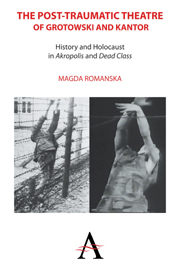 The Post-traumatic Theatre of Grotowski and Kantor
The Post-traumatic Theatre of Grotowski and Kantor Foreword by Kathleen Cioffi
Summary
This book unpacks the multiple layers of meaning in two of the most acclaimed theatre productions of the twentieth century: Jerzy Grotowski's Akropolis and Tadeusz Kantor's Umarła klasa [The Dead Class]. We not only get an unusually informed close reading of Grotowski's and Kantor's masterworks, but also one that situates these productions and their creators firmly in their literary, historical and political contexts. Too often, non-Polish theatre historians and critics, as Romanska points out, ignore the Polish aspects of Grotowski's and Kantor's theatres and construct their own deracinated meanings, while declaring that their inability to understand Polish does not matter. Meanwhile, Polish theatre historians and critics have often ignored the Jewish aspects of these productions, in part because it was once politically dangerous not to do so. The Post-traumatic Theatre of Grotowski and Kantor reclaims both the Polishness and the Jewishness of Grotowski's and Kantor's chefs-d'oeuvre.
In the case of Grotowski, his own compatriots rejected his work early on, in part because his adaptations of the much-loved classics of Polish Romantic and neo- Romantic dramatic literature often conflicted with what the texts were meant to say. As early as 1958, Grotowski approvingly quoted Vsevelod Meyerhold in program notes for an early production: “To choose a play doesn't necessarily mean that one needs to agree with its author.”
- Type
- Chapter
- Information
- The Post-traumatic Theatre of Grotowski and KantorHistory and Holocaust in 'Akropolis' and 'Dead Class', pp. vii - xPublisher: Anthem PressPrint publication year: 2012
